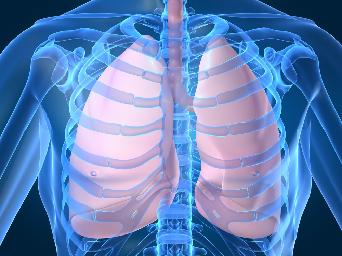Recommended Products
 Respiration provides oxygen to the bloodstream. All body cells need oxygen to live and function properly. Without oxygen, body cells start dying within minutes. Respiration provides oxygen to the bloodstream. All body cells need oxygen to live and function properly. Without oxygen, body cells start dying within minutes.
Common respiratory concerns include runny nose, sneezing, allergies, post—nasal drip, coughs, colds, bronchitis, sinusitis, pneumonia and asthma. Associated problems can include ear— aches, sore throats, swollen lymph nodes and tonsillitis. Signs of chronic respiratory weakness include wheezing, shortness of breath and emphysema.
EXAMINING THE RESPIRATORY SYSTEM
The respiratory system’s primary function is to provide oxygen to the bloodstream. Once in the blood, oxygen travels through the circulatory system to all the cells of the body. The body cells need oxygen to create energy.
When air enters the body through the nose or mouth, it travels down the trachea, or windpipe and into the bronchi. The bronchi branch into smaller tubes called bronchioles, which lead to alveoli. Alveoli are tiny air sacs clustered around the ends of the smallest bronchioles. These air sacs are surrounded by tiny, thin— walled blood vessels called capillaries. Through these thin walls, carbon dioxide leaves the body and oxygen enters it.
The lungs filter the air we breathe and only allow microscopic particles to actually reach the alveoli. The body also uses a mucous membrane to protect the airways and prevent dust particles and other irritants from being absorbed. Because of the lungs’ ability to absorb substances into the bloodstream, some medications are administered this way. For example, many asthma sufferers use an inhaler that allows them to breathe medicine. Essential oils, when inhaled, are also absorbed into the blood via the lungs.
Although we think of the lungs as doing all of the respiratory work, the sinuses and trachea also play critical roles in this system. The sinuses filter and humidify the air we breathe. They also regulate the temperature of incoming air. The trachea, bronchi and bronchioles are lined with cilia—tiny hairlike structures that pulsate continuously; pushing mucus and foreign particles up toward the pharynx so they can be swallowed, broken down and eliminated.
The bronchi and bronchioles are surrounded by smooth muscle. In some people these muscles spasm, making breathing very difficult. This condition is known as asthma, and it affects millions of Americans, often limiting their activities. Doctors at Tel Aviv University in Israel found that 45 percent of asthmatics who took a megadose of vitamin C (2,000 mg) before exercising were able to do so without coughing, sneezing and experiencing shortness of breath. Another 10 percent of participants also experienced benefits, though they were less significant.
You can take steps to promote respiratory health. Practice good hygiene (wash your hands frequently), don’t smoke and avoid second-hand smoke, get plenty of sleep, exercise regularly; practice deep breathing, eat a balanced diet, be wary of air pollution and reduce the amount of stress in your life.
Many supplements also promote respiratory health. Two key herbs for this system are mullein and lobelia. Mullein, a mucilant, is very soothing to the respiratory tract. It has expectorant properties (promotes the elimination of mucus through the mouth) and helps heal inflammation of breathing passageways. Lobelia acts as an antispasmodic on smooth muscles, helping the bronchi to relax. It also has nervine and expectorant properties.
POINTS TO REMEMBER:
• The respiratory system provides oxygen to the bloodstream.
• The sinuses filter and humidify the air we breathe They also regulate the temperature of incoming air.
• The trachea bronchi and bronchioles are lined with cilia—hairlike structures that beat continuously, pushing mucus and foreign particles up toward the pharynx.
• The lungs filter the air we breathe and only allow microscopic particles to reach the alveoli.
• In the alveoli, carbon dioxide leaves the body and oxygen enters the body through thin capillary walls.
• A healthy diet, regular exercise, a minimum of stress and adequate sleep all benefit respiratory system health.
Did You Know?
• On average, a person exchanges about 6 liters of air every minute.
• When the brain is deprived of oxygen, permanent brain damage can occur in as little as four minutes.
• At least 20 million Americans suffer from hay fever.
• Smoking contributes to the loss of mental capacity; including memory, in elderly people. This decline in memory is related to a decrease in blood flow to the brain. It happens at such a slow rate that the smoker does not feel it.
• The Environmental Protection Agency estimates that second-hand smoke causes approximately 3,000 lung-cancer deaths and 37,000 heart-disease deaths in nonsmokers each year
|